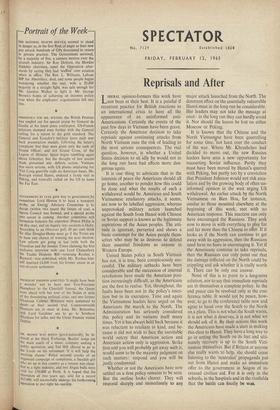Reprisals and After
LIBERAL opinion-formers this week have not been at their best. It is a painful if recurrent practice for British reactions to an international crisis to have all the appearance of an uninformed anti- Americanism. Certainly the events of the past few days in Vietnam have been grave.
Certainly• the American decision to take reprisals against continuing attacks from North Vietnam runs the risk of leading to the most serious consequences. The real question, however, is whether a United States decision to sit idly by would not in the long run have had effects more dan- gerous again.
It is one thing to advocate that in the interests of peace the Americans should all go home, another to ponder how this could be done and what the results of such a withdrawal would be. American and South Vietnamese retaliatory attacks, it seems, are now to be labelled aggression, whereas unprovoked military action launched against the South from Hanoi with Chinese or Soviet support is known as the legitimate aspirations of the Asian peoples. The atti- tude is ignorant, perverted and shows a basic contempt for the Asian people them- selves who may be as desirous to defend their essential freedoms as anyone in Western Europe. United States policy in South Vietnam has not, it is true, been conspicuously suc- cessful. The military setbacks have been considerable and the succession of internal revolutions have made the American posi- tion increasingly difficult, as the Americans are the first to realise. Yet, throughout, the faults have been not in the policy's inten- tion but in its execution. Time and again the Vietnamese leaders have urged on the Americans the march to the North. The Administration has seriously considered this policy and its variants itself many times. Yet it has always held back because it was reluctant to retaliate in kind, and be- cause it did not wish to face the inevitable world outcry that American action and American action only is aggression. Strike first and you will probably get away with it, would seem to be the majority judgment on such matters: respond and you will be justly condemned. Whether or not the Americans have now settled on a firm policy remains to be seen.
But the outline looks clearer. They will respond sharply and immediately to any major attack launched from the North. The deterrent effect on the essentially vulnerable Hanoi must in the long run be considerable. Her leaders may not take the message at once : in the long run they can hardly avoid it. Nor should the lesson be lost on either Moscow or Peking.
It is known that the Chinese and the North Vietnarripse have been quarrelling for some time, not least over the conduct of the war. Where Mr. Khrushchev had decided to move out, the new Russian leaders have seen a new opportunity for reasserting Soviet influence. Partly they must have been moved by Hanoi's quarrel with Peking, but partly too by a conviction that President Johnson would not risk esca- lation and by the growing body of often un- informed opinion in the west urging US withdrawal. An earlier attack by the North Vietnamese on Bien Hoa, for instance, similar to those mounted elsewhere at the beginning of this week, met with no American response. This inaction can only have encouraged the Russians. They seek now to move in with everything to play for and far more than the Chinese to offer. If it looks as if the North can continue to get away with its aggression, then the Russians need have no fears in encouraging it. Yet if the Americans continue to take reprisals, then the Russians can only point out that the damage inflicted on the North could be crippling and ask whether it is really worth it. There can be only one answer.
None of this is to point to a long-term solution, nor to say that immediate reprisals are in themselves a complete policy. In the end peace can be resolved only at the con- ference table. It would not be peace, how- ever, to go to the conference table now and agree to hand over the South to the North on a plate. This is not what the South wants, it is not what it deserves, it is not what we should ask of it. By their actions this week the Americans have made a start in making this clear to Hanoi. They have a long way to go in setting the South on its feet and ulti- mately recovery is up to the South Viet- namese themselves. But if Britain or anyone else really wants to help, she should cease listening to the 'neutralist' propaganda put out from Hanoi and make an immediate offer to the government in Saigon of in- creased civilian aid. For it is only in the schools, in the hospitals and in the ricefields that the battle can finally be won.

































 Previous page
Previous page